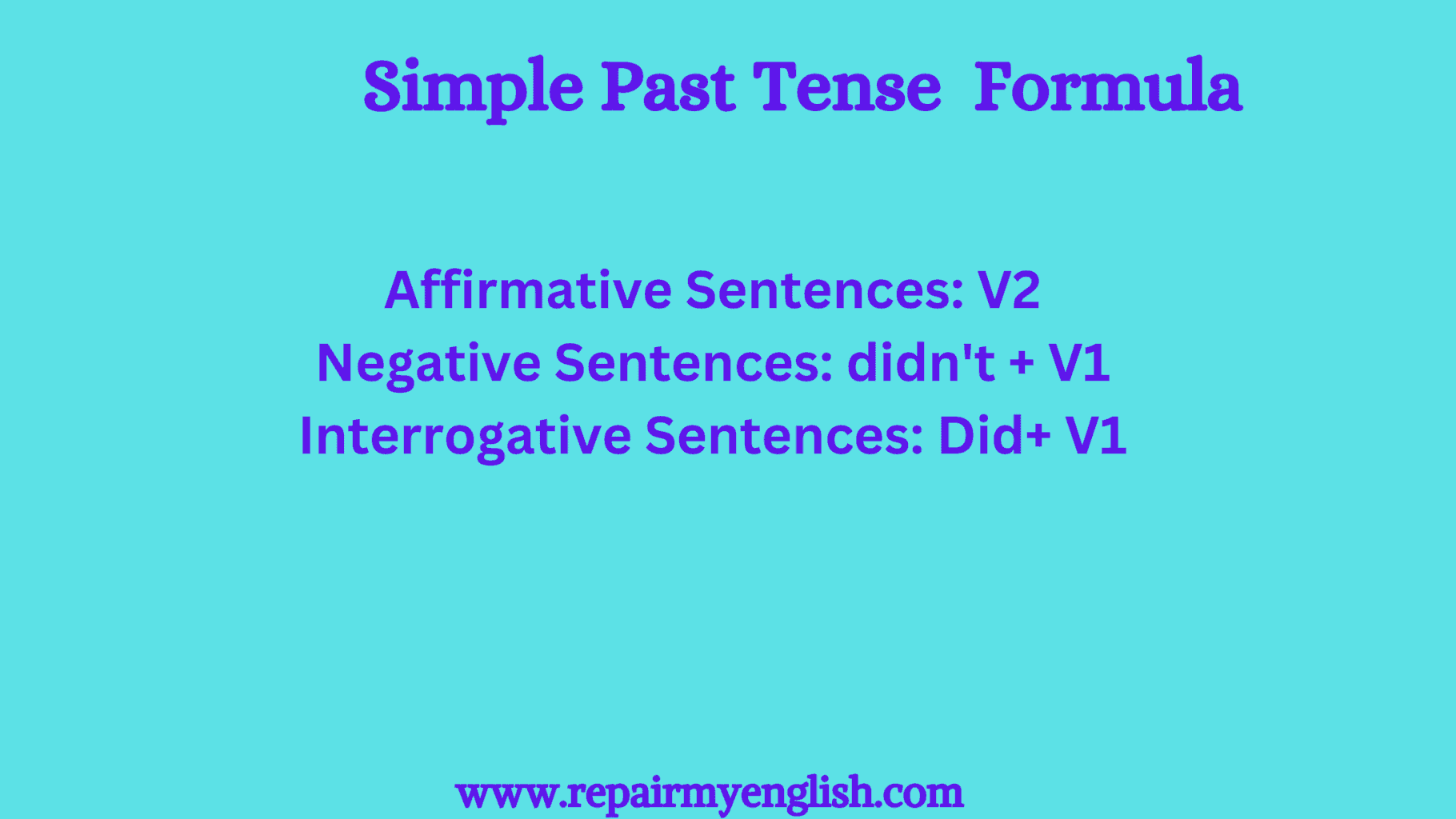Introduction:
The Simple Past Tense is a grammatical tense used to describe actions, events, or states that occurred and were completed in the past. It’s straightforward to indicate a past occurrence without emphasizing its duration or connection to the present.
Simple Past Tense Definition:
The Simple Past Tense is formed by adding the past tense suffix “-ed” to the base form of regular verbs. Irregular verbs have specific past tense forms that do not follow a standard pattern.

Let’s see how simple past tense is used in First Person, Second Person and Third Person.
First-person singular | I + V2 |
I + IInd form of the verb | I worked |
Second-person singular | You + V2 |
You + IInd form of the verb | You worked |
Third-person singular | He / She / It + V2 |
He + IInd form of the verb | He worked |
She + IInd form of the verb | She worked |
It + IInd form of the verb | It worked |
First-person plural | We + V2 |
We + IInd form of the verb | We + worked |
Second-person plural | You + V2 |
You + IInd form of the verb | You + worked |
Third-person plural | They + V2 |
They + IInd form of the verb | They + worked |
Let’s discuss the usage of Simple Past Tense:
Completed Actions: Use the Simple Past to describe actions that happened and were finished in the past.
- Example: She visited her grandmother yesterday.
Sequence of Events: It’s used to indicate the series of events in the past.
- Example: After she finished her work, she went to the gym.
Past Habits or States: Describe past habits or states that are no longer true.
- Example: They lived in that house.
Example Sentences of Simple Past Tense:
- They watched a movie last night.
- She cooked dinner for her family.
- He travelled to Paris last summer.
- The cat played with a ball of yarn.
- We studied hard for the exam.
Time Expressions with Past Simple Tense:
- Yesterday
- Ago
- Last month
- Last week
- Last year
- In 2012
- In 2018
If we use such time expressions in the sentence, it will undoubtedly take simple past tense.
Simple Past Tense usage in Negative Sentences:
Simple Past Tense Rule in Negative Sentences : did not + V1
Contraction: didn’t
Second-person singular | You + didn’t+V1 |
You + didn’t + V1 | You didn’t work. |
Third-person singular | He / She / It + V1 |
He + didn’t + V1 | He didn’t work. |
She + didn’t + V1 | She didn’t work. |
It + didn’t + V1 | It didn’t work. |
First-person plural | We + didn’t + V1 |
We + didn’t + V1 | We didn’t work. |
Second-person plural | You + didn’t + V1 |
You + didn’t + V1 | You didn’t work. |
Third-person plural | They + didn’t + V1 |
They + didn’t + V1 | They didn’t work. |
Simple Past Tense Negative Example Sentences:
- Affirmative: We learnt English grammar at school.
- Negative: We didn’t learn English Grammar at school.
- Affirmative: My father worked in a bank.
- Negative: My father didn’t work in a bank.
- Affirmative: I attended the wedding in 2018.
- Negative: I didn’t attend the wedding in 2018.
- Affirmative: He killed a lion.
- Negative: He didn’t kill a lion.
- Affirmative: I went to the market last week.
- Negative: I didn’t go to the market last week.
Simple Past Tense Interrogative Example Sentences:
- Affirmative: We learnt English grammar at school.
- Negative: We didn’t learn English Grammar at school.
- Interrogative: Did we learn English Grammar at school?
- Affirmative: My father worked in a bank.
- Negative: My father didn’t work in a bank.
- Interrogative: Did my father work in a bank?
- Affirmative: I attended the wedding in 2018.
- Negative: I didn’t attend the wedding in 2018.
- Interrogative: Did I attend the wedding in 2018?
- Affirmative: He killed a lion.
- Negative: He didn’t kill a lion.
- Interrogative: Did he kill a lion?
- Affirmative: I went to the market last week.
- Negative: I didn’t go to the market last week.
- Interrogative: Did I go to the market last week?
Conclusion:
The Simple Past Tense is a basic tense for discussing past actions and events. It’s essential to choose the correct form of regular and irregular verbs to ensure clear communication about actions that occurred and concluded in the past.
For related topics Visit our Grammar Page.
